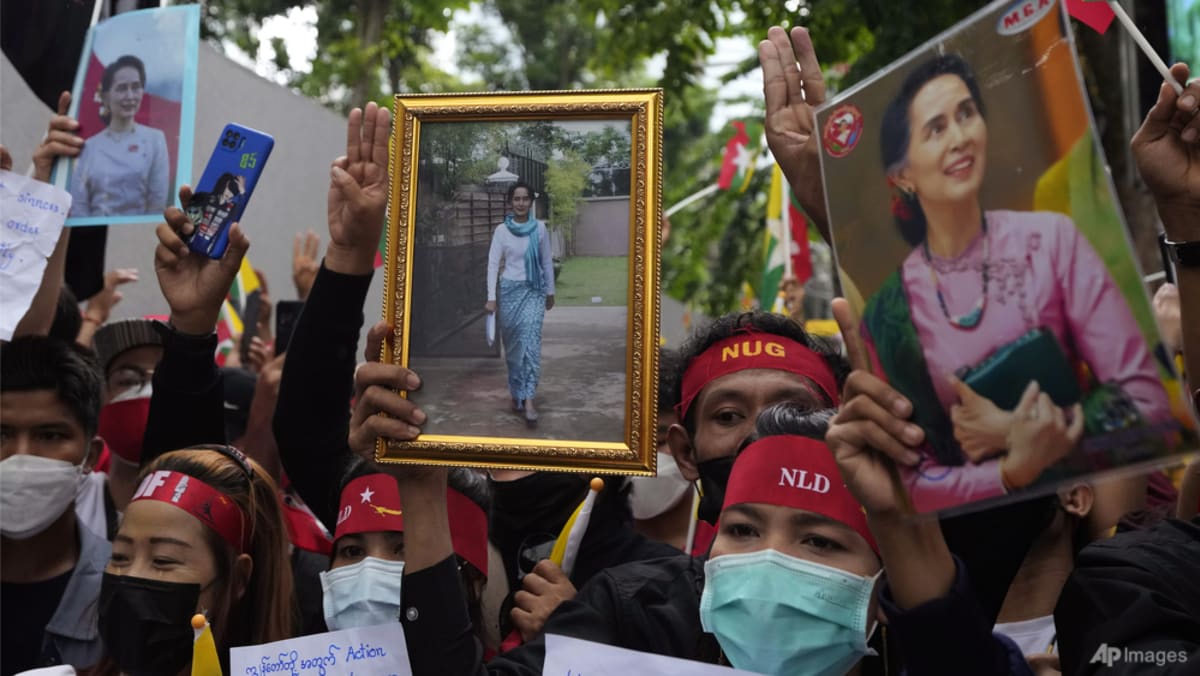
Feb 1, 2021: Military coup d'etat
Soldiers arrested state counsellor Aung San Suu Kyi and other key leaders like president Win Myint in a morning raid.
The military accused Ms Aung San Suu Kyi and her ruling National League for Democracy (NLD) party – which had been reelected in a landslide 2020 win – of electoral fraud.
A state of emergency was declared, and army chief Min Aung Hlaing seized control.
Feb 3, 2021: Civil disobedience movement
Thousands took to the streets nationwide, demanding the release of Ms Aung San Suu Kyi and for the army to recognise the election results.
Civil servants, including teachers and doctors, walked out of their jobs, refusing to work for the military.
The police announced first charges for Ms Aung San Suu Kyi – the possession of walkie-talkies without proper paperwork.
Feb 6, 2021: Large-scale protests
The police were accused of using excessive and lethal force against anti-coup demonstrations growing in strength.
The junta limited internet access and blocked social media platforms, which are major sources of independent news and for organising protests.
Feb 11, 2021: US sanctions
The United States imposed first sanctions targeting coup leader Min Aung Hlaing and other senior officials. Others including the European Union and Britain soon followed.
Feb 19, 2021: First casualty
Mya Thwate Thwate Khaing, 20, became the first casualty in the violence.
She was shot in the head as security forces dispersed rallies, and succumbed to injuries after she was taken off life support.
Feb 26, 2021: UN ambassador fired
Myanmar’s ambassador to the United Nations Kyaw Moe Tun made an emotional appeal to the General Assembly in New York.
He urged the international community to use “any means necessary” against the junta and help to “restore democracy”.
He was fired a day later by Myanmar's military rulers, but the UN continues to recognise him as the nation’s representative.
March 2021: Violence escalates
Military forces – also known as the Tatmadaw – started using airstrikes, including on villages, a tactic that continues even today.
April 16, 2021: Formation of NUG
On the resistance front, ousted lawmakers and other individuals formed the shadow National Unity Government (NUG).
It commands sizable support from the public and maintains diplomatic relations with foreign governments.
Its armed wing, the People’s Defence Force formed by volunteer civilian fighters, attacks junta targets and says it is capable of manufacturing its own weapons.
April 24, 2021: Political breakthrough … or not
Association of Southeast Asian Nations (ASEAN) leaders and General Min Aung Hlaing agreed on a peace plan, known as the Five-Point Consensus.
It was hoped this would be the first milestone to end the crisis.
However, the junta has since refused to act on the plan, insisting on implementing its own peace roadmap – which involves holding elections. None has been held so far.
August 2021: Death toll rises
Gen Min Aung Hlaing formed a caretaker government and appointed himself prime minister.
The death toll of civilians killed since the coup crossed 1,000, according to human rights group the Assistance Association for Political Prisoners (AAPP).
October 2021: Junta barred from ASEAN meet
In a rare move, ASEAN leaders agreed to exclude Gen Min Aung Hlaing from the regional bloc’s annual summit.
It was unprecedented as the 10-member grouping traditionally avoids interfering in its members' affairs.
Until today, Myanmar’s ruling generals remain barred from key meetings over their failure to make progress on the agreed peace plan.
December 2022: Aung San Suu Kyi’s trials conclude
Aung San Suu Kyi received a total of 33 years in jail at the end of her trials.
She was charged with numerous offences – including breaching the Official Secrets Act, committing electoral fraud and corruption, as well as those illegal walkie-talkies.
Oct 27, 2023: Operation 1027
The Three Brotherhood Alliance – a trio of ethnic armies – launched a major offensive against the Tatmadaw.
This was the first time ethnic armies conducted coordinated and prolonged attacks against the military.
Observers say Operation 1027, named after the date of the mission, is the biggest threat to the junta so far.
The operation has also inspired other ethnic armed groups and rebels to launch offensives against the Myanmar army.
The NUG has also publicly thrown its support behind Operation 1027.
https://news.google.com/rss/articles/CBMiaWh0dHBzOi8vd3d3LmNoYW5uZWxuZXdzYXNpYS5jb20vYXNpYS9teWFubWFyLWNvdXAtMy15ZWFycy1hbm5pdmVyc2FyeS1jbmEtZXhwbGFpbnMtdGltZWxpbmUtanVudGEtNDA5MTg2MdIBAA?oc=5
2024-02-01 11:13:00Z
CBMiaWh0dHBzOi8vd3d3LmNoYW5uZWxuZXdzYXNpYS5jb20vYXNpYS9teWFubWFyLWNvdXAtMy15ZWFycy1hbm5pdmVyc2FyeS1jbmEtZXhwbGFpbnMtdGltZWxpbmUtanVudGEtNDA5MTg2MdIBAA
Tidak ada komentar:
Posting Komentar